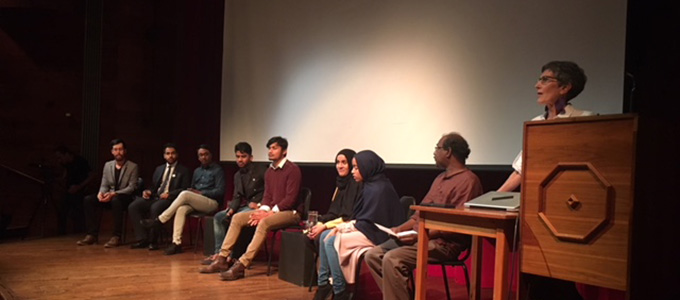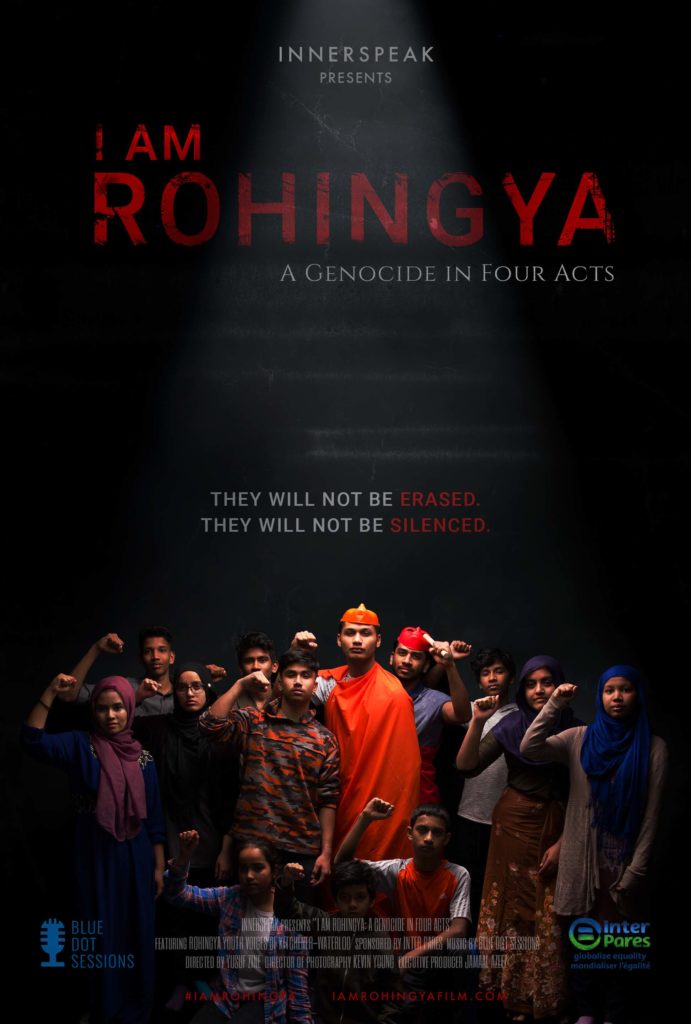I Am Rohingya: Screening and Discussion

On Tuesday October 9, Trinity’s Ethics, Society & Law Program and the Margaret MacMillan Trinity One Program collaborated with Hart House Debates and Dialogues to host a screening of Yusuf Zine’s 2018 film I Am Rohingya: A Genocide in Four Acts. The screening was followed up by a Q&A with the director, art director and executive producer, along with four members of the cast. The conversation, moderated by poet and scholar R. Cheran, was as fascinating and impactful as the film.
The Rohingya people are predominantly Muslim, although some identify as Hindu, and form an ethnic minority in Burma (now Myanmar). Not only do Myanmar laws not recognise the Rohingya as one of the nation’s eight Indigenous groups, Myanmar denies the Rohingya as citizens. Anti-Muslim sentiments in a predominantly Buddhist nation have resulted to the persecution of Muslims in Myanmar, a reality that challenges the preconceptions the Western world has on the two religions.
 The film chronicles the journey of fourteen Rohingya refugee youths, all living in a tight-knit community in Kitchener, Ontario, who use theatre as an outlet to depict their and their families’ harrowing experiences of oppression and persecution in Myanmar. Myanmar security forces and Buddhist extremists have driven the Rohingya peoples off their land and committed widespread looting and abuse of Rohingya muslims. Outside of military raids, the Rohingya people are subject to theft, discrimination, and extortion from authorities. The plight of over 650,000 Rohingya peoples, many of whom are displaced and seek refuge in Bangladesh, is now said to be the world’s fastest growing refugee crisis.
The film chronicles the journey of fourteen Rohingya refugee youths, all living in a tight-knit community in Kitchener, Ontario, who use theatre as an outlet to depict their and their families’ harrowing experiences of oppression and persecution in Myanmar. Myanmar security forces and Buddhist extremists have driven the Rohingya peoples off their land and committed widespread looting and abuse of Rohingya muslims. Outside of military raids, the Rohingya people are subject to theft, discrimination, and extortion from authorities. The plight of over 650,000 Rohingya peoples, many of whom are displaced and seek refuge in Bangladesh, is now said to be the world’s fastest growing refugee crisis.
Two ES&L students who attended the event, Gina Kwon and Lis Alers-Hankey, share their experiences of the film screening and discussion.
Gina Kwon
Who are the Rohingya? I walked into the George Ignatieff Theatre on Tuesday night to an already full auditorium. Not knowing much about the Rohingya people, I expected to view a film on the grim lived-experiences inside refugee camps. Director Yusuf Zine quickly took to the stage and gave a preface to the film, I Am Rohingya: A Genocide in Four Acts, an appropriate title according to Zine because “it was about time we call it what it was, rather than ‘ethnic cleansing.’”
The film certainly brings awareness to the Rohingya genocide unfolding in Myanmar. What is more, however, is that the film is in itself a courageous act of resilience, as the Rohingya youth assert their presence and share their cultural identity, conveying that “the most persecuted people on Earth” will not be forgotten. The film, furthermore, left this audience wondering why the institutions we have in place for peacebuilding and harm-reduction are failing in certain parts of the world, like Myanmar and for the Rohingya. I left the film with so much humility and sadness for their injustice. It is hard to turn away from what is shared with the audience across the screen by the Rohingya youths, and the film successfully calls on for greater awareness and dialogue on systematic ethnic cleansing of the Rohingya peoples.
Lisa Alers-Hankey
I Am Rohingya, A Genocide in Four Acts, artfully catalogued the experiences of a group of Rohingya teens as they navigated Canadian life after Myanmar and Bangladesh refugee camps. The persistent traumas depicted in the play captured on film place the Rohingya as ‘the most persecuted people,’ a title none would desire, and yet, the genocide is rarely discussed or taken action upon. One influential, state-aligned religious extremist interviewed in the film repeatedly declared the news footage and reports of the genocide fake. Sound familiar? Similar proclamations about fake news and blasts against the UN echo through the halls of the White House. The issue of recognition and identity is not one of external judgement or perception, but a deeply personal account of life and history. Proclamations of “fake-news” and ignorance of its repercussions are gaining steam. So I will end with the same call to action as the cast artfully left with me Tuesday night: share the story, share the truth and keep fighting for justice and recognition.
Categories: Academic; Arts & Science; Ethics, Society & Law; Student News


